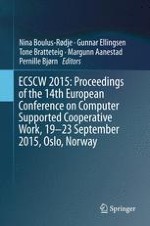2015 | OriginalPaper | Chapter
Measures and Tools for Supporting ICT Appropriation by Elderly and Non Tech-Savvy Persons in a Long-Term Perspective
Authors : Claudia Müller, Dominik Hornung, Theodor Hamm, Volker Wulf
Publisher: Springer International Publishing
Activate our intelligent search to find suitable subject content or patents.
Select sections of text to find matching patents with Artificial Intelligence. powered by
Select sections of text to find additional relevant content using AI-assisted search. powered by
